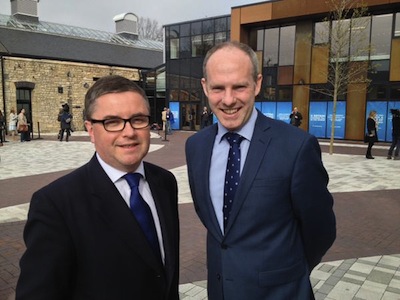
Swindon MPs Justin Tomlinson & Robert Buckland have welcomed new figures today showing 211,000 more people in work across the South West since Labour were last in power and a record level of employment across the UK as a whole – with over 2.3 million more people enjoying the security of a job than in 2010.
In Swindon, the number of people claiming the Jobseeker's Allowance element of Universal Credit has fallen by 138 in the last month. It is therefore down by a staggering 3,024 or 62.7% – since 2010. Youth unemployment is down by 57% over the same period.
The figures also show that wages are continuing to grow strongly, with average total pay up 2%, while inflation is close to flat. This means working people across Swindon are seeing their wages grow and our plan for a higher-employment and higher-wage economy is working.
With employment at a record 74%, and the majority of the increase in employment over the last year in full-time jobs, today’s statistics show that our economic plan is working. It’s creating jobs and growing pay packets for families in Swindon as we continue to move towards the goal of full employment that we committed to in our manifesto.
Justin Tomlinson MP said: "Today’s figures are excellent news for families in Swindon, marking an important milestone in the road to full employment. With employment at the highest rate in our history, wages continuing to grow above inflation, and the unemployment rate now below the level we last saw before Labour’s Great Recession, it’s clear our economic plan is working. We can see that here in Swindon, where the number of people relying on Jobseeker’s Allowance or Universal Credit while out of work has fallen by 3,204 since 2010 – a 62.4% drop."
Robert Buckland MP said: "Each new job mean a worker and their family with the security of a pay packet. We've seen a major fall in unemployment across our town since 2010 but with Britain facing a dangerous cocktail of new risks in the global economy this year it’s more important than ever that we stick to our plan to fix Britain’s finances, as we continue to work to deliver security for families here in Swindon and across the UK."
Headline national figures
Key statistics
- Employment: 31.4 million (up 588,000 over the past year and up by over 2.3 million since 2010).
- Employment rate: 74% (up 1.1% over the past year and up 3.8% since 2010).
- Unemployment: 1.68 million (down 239,000 over the past year and down 835,000 since 2010).
- Unemployment rate: 5.1% (down 0.8% over the past year and down 2.9% since 2010).
- Claimant count (Jobseeker’s Allowance and Universal Credit not in work): 785,900 in December (down 95,400 on last year and down 708,900 since 2010).
-
Wages: average total pay rose by 2% over the last year. Inflation over the same period was close to flat.
Other useful statistics:
- The employment rate is at the highest in our history - at 74% of people aged 16-64.
- The unemployment rate has fallen to its lowest for nearly a decade – at 5.1%.
- Private sector employment is up by 2.7 million since 2010.
- There are more women in work than ever before with 1 million more women in work since 2010, and the number of unemployed women down by 89,000 over the year.
- The proportion of under-25s who are unemployed and not full-time students is the lowest on record – at 5.8%
- Among older people (50-64), employment is up 112,000 on the quarter and 261,000 on the year to 8.37 million.
- The number of long-term unemployed people has fallen by 25% in the last year to 488,000.
- Vacancies were at 756,000 in the three months to December, up 46,000 on the year and 294,000 since 2010.
Labour always try and tell Britain that all these jobs are part-time, insecure and poorly paid – in fact:
- Almost three-quarters of the growth in employment since 2010 has been full-time.
- Only 2.4% of people in work are on zero-hours contracts. Unlike the last Labour Government, who did nothing, we have taken action to clamp down on abuses by banning exclusivity contracts.
- Real wages are continuing to rise strongly.
It was Labour that left people with fewer jobs and fewer opportunities:
- The number of unemployed people increased by one million in Labour’s last term in office.
- The number of people on unemployment benefit rose by 82% in Labour’s last term.
- Youth unemployment rose by 45% under Labour – meaning young people were not getting the skills they need to get on in life.
- The number of households where no member had ever worked nearly doubled under Labour.

